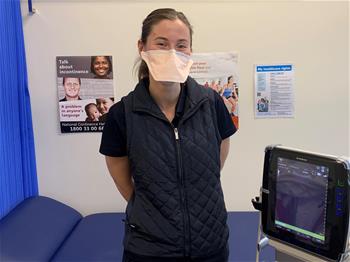This Prostate Cancer Awareness Month, meet our men's health physiotherapist, Emily.
Emily plays an important role in supporting patients in their recovery from prostate surgery, and also works with a range of different patients in our outpatient physiotherapy clinic.
In our Q & A with Emily, learn more about how physiotherapy can help improve side effects and support patients to get back to doing the things they enjoy following prostate surgery.
Tell us about your role
I am a physiotherapist with special interests and training in men’s and women’s health physiotherapy. As a men’s health physio, I work as part of a multidisciplinary team who provide collaborative care for patients before and after surgery. I also see patients in our outpatient physiotherapy clinic and can help with a range of symptoms including bladder control and leakage.
 For our patients who are having surgery for prostate cancer, I work closely with Kitty, our Prostate Cancer Specialist Nurse. Often, we will see patients on the same day in our outpatient clinic, before and after their surgery. This gives us the great opportunity of working together in collaboration, sharing our knowledge and skills. We are also in close contact with our surgeons as well, working together to achieve the best outcomes possible.
For our patients who are having surgery for prostate cancer, I work closely with Kitty, our Prostate Cancer Specialist Nurse. Often, we will see patients on the same day in our outpatient clinic, before and after their surgery. This gives us the great opportunity of working together in collaboration, sharing our knowledge and skills. We are also in close contact with our surgeons as well, working together to achieve the best outcomes possible.
What are some of the common side effects after prostate cancer surgery?
The most common side effects are loss of bladder control which can range in severity, bladder leakage and loss of sexual function.
How can physiotherapy help?
Men’s health physiotherapy can help by teaching patients about their pelvic floor muscles, with improving bladder control, and gradually improving general fitness.
Our pelvic floor rehabilitation program works alongside general rehabilitation. In addition to pelvic exercises, we also help to ease patients back into exercise and guide them through a gradual return to normal activities. Sometimes return to normal activity can be limited by bladder control, so it’s important that we look at pelvic floor function and return to activities together at the same time.
We also use ultrasound to assess the pelvic muscles. It can be challenging to work out how to use the muscles at first, so we use the ultrasound which shows the picture of the muscles tightening and relaxing which is really helpful for patients.
What can patients expect from their first men’s health physiotherapy appointment?
We try to meet patients before their prostate cancer surgery as much as possible. We highly recommend this to give patients the opportunity to learn their pelvic floor exercises and how to use their pelvic floor muscles correctly which is usually much easier to do before surgery. The side effects of prostate surgery can cause worry for many patients, so giving them some pelvic exercises to help minimise side effects is one proactive thing they can do before and after surgery, which can also be really helpful mentally.
At the first appointment, we also want to learn more about our patients, especially their occupations, physical activity and what they enjoy doing. It’s helpful for us to know if a patient is an avid golfer or working in a highly physical job for example. Knowing this information helps us to understand the types of activities they will want to get back to after surgery and we can chat about what their recovery might look like. It’s also a really important opportunity to provide some much-needed support and encouragement.
Although many don’t know, men have pelvic floors too! When would you recommend seeing a men’s health physiotherapist?
Half the men I see don’t know they have a pelvic floor. It’s certainly something spoken about more among females, and our patients can often find empathy from their female friends and acquaintances. Most importantly, you don’t have to put up with symptoms on your own. It can be worthwhile seeing a men’s health physiotherapist who can help.
Anyone experiencing trouble controlling the bladder or experiencing bladder leakage should speak to their doctor. These symptoms can start after surgery, or sometimes can be caused by an enlarged prostate. A men’s health physiotherapist can then help with some practical exercises and techniques to help improve symptoms. Men can also experience changes in bladder urgency or frequency such as rushing to the toilet or going a lot through the day and night. Physiotherapy techniques such as bladder retraining can help with this.
How can patients make an appointment?
Anyone can visit us at the St Andrew’s outpatient physiotherapy clinic. No referral is needed. To make an appointment or for any questions, please phone 07 3834 4285 or email sawmh-dayrehab@uchealth.com.au.
Patients having prostate surgery at St Andrew’s will often be referred to our physiotherapy clinic by their specialist, or we will meet on the ward the day after surgery.